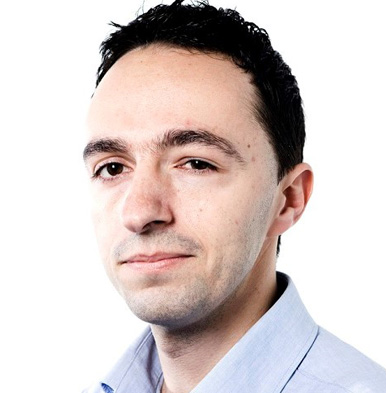
Associate Professor, Institute of Digital Games
Georgios N. Yannakakis is Associate Professor at the Institute of Digital Games, University of Malta (UoM) and director of the game artificial intelligence research group.
He received both the 5-year Diploma (1999) and the M.Sc. (2001) degree from the Technical University of Crete, Chania, Greece and the Ph.D. (2005) degree in Informatics from the School of Informatics, Institute of Perception, Action and Behaviour, University of Edinburgh. He was employed as postdoctoral fellow at the Mærsk Mc-Kinney Møller Institute, University of Southern Denmark, Odense. Prior to joining the UoM he was Associate Professor at the Center for Computer Games Research, IT University of Copenhagen (2007-2012) and Adjoint
Lecturer of Robotics at the Production Engineering & Management Department, Technical University of Crete, Chania, Greece (2007).
Prof. Yannakakis does research at the crossroads of advanced game technology, artificial intelligence, affective computing and human-computer interaction. He pursues research concepts such as user experience modelling and procedural content generation for the design
of personalised digital interactive systems for entertainment, education, training and health. More specifically, he investigates the relationship between user models of different levels of human response (cognitive, physiological, emotional) and adaptive machine learning.
His research interests and publications lie in the fields of Computational Intelligence in Games, Player Experience Modeling, Multi-modal Intelligent Interaction, Machine Learning, Affective Computing, Computational Creativity, Neuro-Evolution and Procedural Content Generation.
He has published more than 180 journal and international conference papers in the aforementioned areas of research and his work has been cited broadly. Among his theoretical contributions, the most important are the establishment of generic preference learning schemes
for detecting and modeling user affective and cognitive states across multiple modalities of user input (incl. physiological and behavioral patterns); the design of generic computational models of user experience in specific genres of computer games; and the design of
adaptation procedures (via content generation) which are driven by user experience and lead to digital entertainment of richer interactivity and optimal experience (i.e. Experience-driven procedural content generation).
Prof. Yannakakis currently is and has been the Principal Investigator of several national and European funded projects; during his career he has attracted more than €3 million (budget alloted to his institutes) of external funding to support his research activities.
Prof. Yannakakis has been responsible for the establishment of the game technology line of the Games graduate program at ITU and the MSc in Digital Games at UoM which are currently two of the world-leading educational programs in game technology. He has developed and taught (or co-taught) courses within the area of game technology such as advanced game technology, affective computing, game analytics and data mining, modern AI for games, game development, procedural content generation as well as courses on machine learning, robotics, optimization and control.
The game artificial intelligence research group, he directs, currently consists of 5 researchers: 1 Senior Lecturer, 1 Lecturer, and 3 PhD students. He is an Associate Editor of the IEEE Transactions on Affective Computing and the IEEE Transactions on Computational
Intelligence and AI in Games.
Research Interests:
– Computational Intelligence in Games (player experience modeling, game adaptation, procedural content generation, mixed-initiative game design)
– Computational Creativity (generative systems, self-evaluative autonomous systems)
– Human-Computer Interaction (User Modeling, Cognitive Modeling, Human-centered design, Personalization, multimodal interfaces, fusion engines)
– Machine Learning (Preference Learning, Reinforcement Learning, Supervised Learning, Unsupervised Learning)
– Neuro-Evolution (Genetic Search, Probabilistic Search, Augmented ANN Topologies)
– Affective Computing (Affective sensing, Affect Modeling, Affect Annotation)
– Multi Agent Systems (Multi Agent Learning/Collaboration/Competition)
Selected Publications:
- G. N. Yannakakis, and J. Hallam, “Modeling and Optimizing Player Satisfaction in Games: An Introduction,” Invitation by AAAI/MIT Press (under preparation)
- K. Karpouzis., G. N. Yannakakis (2016) Emotion in Games: Theory and Praxis, Springer
- G. N. Yannakakis, A. Paiva, K. Isbister and K. Karpouzis. (2014) Emotion in Games, Special Issue at the IEEE Transactions on Affective Computing journal
- C. Browne, G. N. Yannakakis, S. Colton (2012) Computational Aesthetics in Games, Special Issue at the IEEE Transactions on Computational Intelligence and AI in Games journal, Volume: 4, Issue: 3
- Di Chio, C., Cagnoni, S., Cotta, C., Ebner, M., Ekart, A., Esparcia-Alcazar, A.I., Merelo, J.J., Neri, F., Preuss, M., Richter, H., Togelius, J., Yannakakis, G.N. (2012) Applications of Evolutionary Computation, Lecture Notes on Computer Science, vol. 7248
- Di Chio, C., Cagnoni, S., Cotta, C., Ebner, M., Ekart, A., Esparcia-Alcazar, A.I., Merelo, J.J., Neri, F., Preuss, M., Richter, H., Togelius, J., Yannakakis, G.N. (2011) Applications of Evolutionary Computation, Lecture Notes on Computer Science, vol. 6624
- Di Chio, C., Cagnoni, S., Cotta, C., Ebner, M., Ekart, A., Esparcia-Alcazar, A.I., Goh, C.-K., Merelo, J.J., Neri, F., Yannakakis, G.N. (2010) Applications of Evolutionary Computation, Lecture Notes on Computer Science, vol. 6024
- G. N. Yannakakis, J. Hallam (2007) “Proceedings of the AIIDE’07 Workshop on Optimizing Player Satisfaction,” AAAI Press Technical Report WS-07-01
- G. N. Yannakakis, J. Hallam (2006) “Adaptive Approaches for Optimizing Player Satisfaction in Computer and Physical Games: Proceedings of the SAB’06 Workshop,” Technical Report TR-2006-2, Mærsk Mc-Kinney Møller Institute, University of Southern Denmark, September
